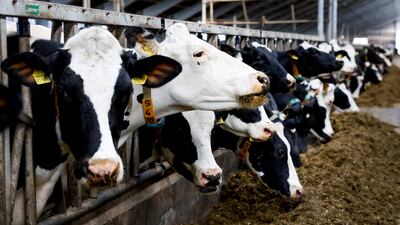The collective profits of 40 of the world’s largest livestock producers may fall by almost $24 billion in 2030 from 2020 levels as a result of climate change, according to an estimate by an investor group called FAIRR.
The forecast reduction in profits mainly reflects a jump in feed prices and carbon taxes. The group of 40's profit margins could fall by 7 per cent.
Those in North America, including Tyson Foods and egg producer Cal-Maine Foods, will be among the hardest hit as profit margins fall by 11 per cent on average, the data suggests.
Other large meat producers, such as Brazil’s JBS and China’s WH Group, also will be affected, according to FAIRR.
Cows are the highest-emitting livestock, so companies producing beef and dairy are more exposed to carbon taxes, FAIRR said.
The estimates are based on an assumption that average global temperatures will increase by 2°C by 2100.
Under this scenario, and without mitigation, half of the 40 livestock companies assessed would be operating at a loss in 2030.
“There’s a lot of value at risk,” said Maria Lettini, executive director of FAIRR, a non-profit group focusing on environmental, social, and governance risks in the global food sector with the backing of investors managing $70 trillion in assets.
“We want investors to have a clear voice” when persuading meat producers to assess and manage the risks of higher temperatures on their supply chains and eventual profitability, she said.
FAIRR was founded by Jeremy Coller, chief investment officer of UK private equity firm Coller Capital.
A recent report by the UN’s Intergovernmental Panel on Climate Change said the world is likely to exceed 1.5°C of warming “in the near term”.
Livestock producers are vulnerable because the supply of feed crops such as maize and soybeans can be affected by excess heat, drought and shifting rainfall patterns.
Currently, only six of the 40 companies analysed have carried out climate scenario analysis.
“Most companies don’t have a climate scenario analysis,” said Tovia Rosner, an analyst for Allianz Global Investors’ Food Security Fund, which has $69 million of assets under management.
“It’s something we’d definitely push for in our engagements.”
The potential hit to industry profit is driven mainly by higher climate-related costs, which are forecast to increase by more than 9 per cent on average, according to FAIRR.
Of that increase, 5 per cent relates to higher feed prices and 4 per cent to expected carbon taxes on livestock emissions.
The non-profit suggests large meat and dairy producers can mitigate the risk by diversifying products, using alternative feed ingredients and tilting portfolios towards plant-based alternatives.
North American companies appear to be the most exposed to potential losses. Of six companies analysed, profit margins would fall by 11 per cent on average by 2030, driven by a 15 per cent average cost increase that mainly reflects higher feed prices, FAIRR said.
“One key finding is that North America will face higher impacts because of the price of maize,” said Simi Thambi, climate economist at the non-profit.
The carbon-tax effect can be harder to pin down. None has yet imposed a carbon tax on agriculture, though carbon-pricing mechanisms for emissions in other industries have become more popular.
New Zealand, where half of all emissions emanate from agriculture, is among the first countries to propose a levy on agricultural emissions.
The FAIRR data represents “a comparison across scenarios that can help livestock companies and investors understand the uncertainty that comes with climate change”, said Ms Lettini.

